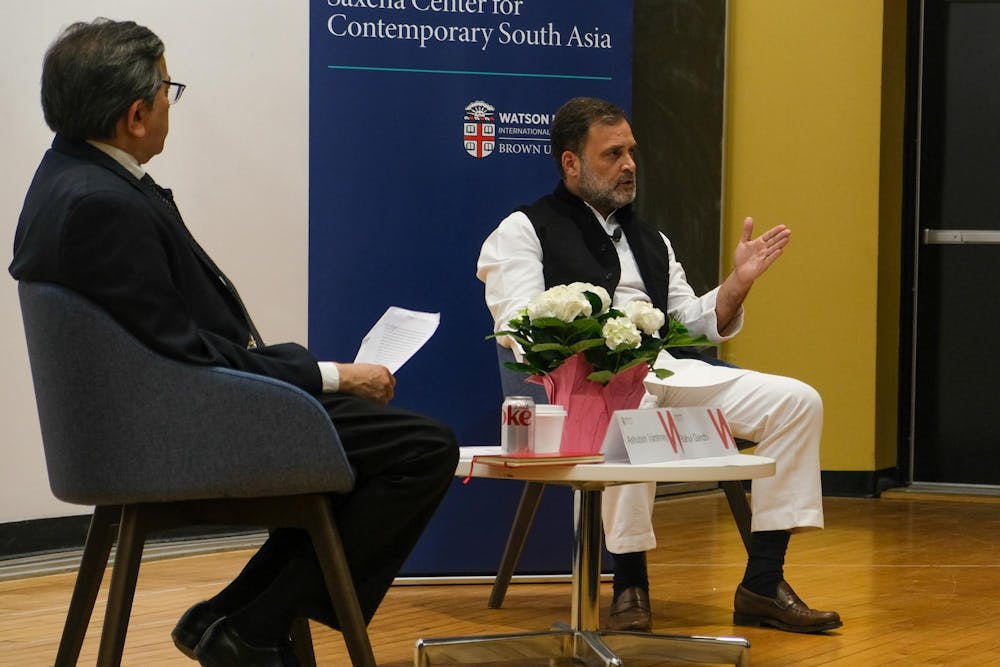On Monday, Rahul Gandhi, former president of the Indian National Congress party, spoke at an event hosted by the Watson Institute for International and Public Affairs’s Saxena Center for Contemporary South Asia. Ashutosh Varshney, director of the Saxena Center and professor of international studies and the social sciences and political science, moderated the event.
Gandhi is currently the opposition leader in the Lok Sabha, the lower house of India’s parliament, and has represented different constituencies as a member of the Lok Sabha since 2004. Gandhi is the great-grandson of Jawarhalal Nehru, India’s first prime minister.
During the discussion, Gandhi commented on the extent of India’s democratic backsliding in recent years. In particular, he alleged that India’s electoral institution has lost some credibility, noting that during the recent state assembly election in Maharashtra — one of India’s 28 states — around 10 million new voters appeared within a matter of months in the state’s voter rolls.
“Many times, the numbers wouldn’t add up,” he said.
Gandhi suggested that the current ruling party, the Bharatiya Janata Party, was responsible for this discrepancy, adding that “there’s a direct correlation between where these (voters) are added and where the BJP wins.”
Gandhi also said the internal structure of the BJP, which is a cadre-based party, lends itself to undemocratic leadership due to their centralization of power. He believes that his party, the Congress party, is better “designed to decentralize power and listen to the people.”
In his talk, Gandhi emphasized the importance of diversity in India, which he claimed was currently under a “systemic attack” by Hindu nationalists. He argued that India should be characterized by religious tolerance and inclusion, but that the BJP is not representative of this ideology.
Gandhi also referenced the stark increase in the internal security budget after the BJP took power, noting that India now spends more on internal security than on education. Communal tensions within the country, Gandhi believes, can be resolved without resorting to violence.
“Why should you use force?” he asked.
Gandhi reiterated the importance of grassroots movements in his politics, saying that “the idea that different people have completely different perspectives … lies at the heart of Indian thought.”
In 2022, Gandhi led his party and the public in a march across India that spanned around 2,500 miles. The march was a united protest against the BJP as part of the Congress party’s Bharat Jodo Yatra campaign for Indian unity. Through this campaign, Gandhi “learned how to listen to people properly,” he said.
Gandhi said the campaign also originated the famous slogan “Nafrat ke bazaar mein, mohabbat ki dukkan,” which Varshney translated to “in the marketplace of hatred, you are creating a shop of love.”
Love, Gandhi said, is “the most powerful tool in politics.” He told attendees that opening a conversation with the words “I love you” helps him form an instant connection with his constituents.
He also advocated for nationwide adoption of the caste census — which would ask individuals about their caste in the national census — arguing that it would “transform” Indian politics.
“To me, the caste census is basically putting the truth on the table,” Gandhi said, noting that as of now, only a handful of states have implemented a caste census.
Gandhi also commented on increasing tensions between India and China, noting that “the single biggest challenge in front of India today is to create a production system to compete with the Chinese,” he said.
In Gandhi’s view, China and Pakistan’s alliance poses a “security challenge” to India. As part of his approach to international diplomacy, he advocates for a partnership between India and the United States, he told attendees.
“How does India, with its scale and its know-how, partner with the United States to build an alternative, serious alternative to the Chinese manufacturing system?” he asked.
Gandhi’s conversation with Varshney was followed by a Q&A session, in which audience members asked Gandhi unfiltered questions. The audience members — many of whom were Brown students — asked about topics ranging from the role of artificial intelligence in India to India’s relations with Pakistan and Bangladesh.
Gandhi “shied away from no questions” during the discussion and Q&A, Varshney said in an interview with The Herald. “We are very happy with how well it went.”
During the event, Gandhi made comments about democracy “that sounded very nice,” said attendee Gurpartap Singh ’26. “But we want to see more action from the Congress party.”
Another attendee, Lavleen Madahar ’26, expressed similar sentiments.
“Since we’re being encouraged to ask unfiltered questions,” Madahar said, “I would have liked more unfiltered answers.”
The BJP could not be reached for comment.
Correction: This article has been updated to reflect that Gandhi believes the 10 million voters appeared on the voter rolls in the Maharashtra state assembly elections, not the Lok Sabha elections. The Herald regrets the error.

Annika Singh is a senior staff writer from Singapore who enjoys rewatching Succession and cheating on the NYT crossword.





